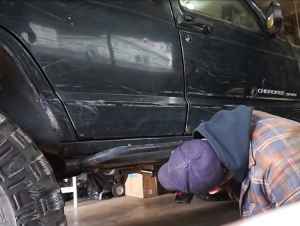Rocker panels serve as a fundamental component within the structural framework of modern vehicles, situated longitudinally along the lower sides between the front and rear wheel wells. These elements are crucial not only for enhancing the vehicle’s aesthetic appeal by defining its lower profile but also for their structural role in reinforcing the chassis. By understanding what a rocker panel is, vehicle owners can better appreciate the necessity of maintaining these components to uphold the vehicle’s structural integrity and ensure its long-term durability.
The Importance of Rocker Panels in Vehicle Safety and Integrity
Rocker panels play an indispensable role in the structural dynamics of a vehicle, primarily contributing to the overall stiffness and stability of the body, particularly in vehicles with unibody construction where the body and frame are integrated. These panels help distribute weight and support the vehicle’s load, preventing excessive flex and deformation of the chassis during operation. Moreover, in the event of a side collision, robust rocker panels are crucial as they provide the first line of defense, helping to absorb and distribute impact forces away from the passenger compartment, thereby significantly enhancing occupant protection.
Common Issues and the Need for Replacement

Detailed Steps in Rocker Panel Maintenance and Replacement
Effective maintenance and timely replacement of rocker panels are essential to extend their life and functional integrity:
- Conduct thorough inspections regularly to check for any signs of wear, rust, or damage.
- Clean the panels thoroughly to prevent build-up of salts and debris that can initiate and accelerate corrosion.
- Apply quality rust-proofing products to protect against environmental damage.
- In the case of damage or severe rust, remove the affected panel carefully, treat the underlying area to eliminate all rust, and install a high-quality replacement panel that matches the vehicle’s specifications.
Enhancements and Upgrades
For vehicle owners looking to enhance their vehicle’s durability against harsh conditions, upgrading the rocker panels to higher-quality materials can be an effective strategy. Adding accessories such as the best fender flares for Jeep can also help protect the rocker panels by minimizing the amount of debris and moisture that can accumulate on them. Fender flares extend the body of the vehicle and cover the wheels, catching road spray and reducing the direct impact on the rocker panels. Detailed recommendations on selecting the right fender flares can be explored in another article on our site.
Conclusion
Rocker panels are essential for the structural integrity and safety of vehicles, providing necessary support and contributing significantly to the vehicle’s ability to withstand and distribute impact forces. Ensuring that these components are well maintained and promptly replaced when damaged is crucial for maintaining the vehicle’s performance and safety. Vehicle owners should prioritize regular inspections and upkeep as part of their routine maintenance schedule to keep their rocker panels – and their vehicles – in optimal condition. Being proactive about care can prevent costly repairs and extend the life of the vehicle.

Add Comment